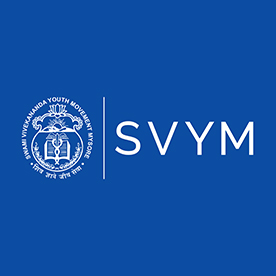Online partnership gives Global Health students real-world knowledge
 As part of an international collaboration with Swami Vivekanada Youth Movement (SVYM), second-year students from the McGovern Medical School Center for Global Health participated in pair of virtual learning sessions with renowned faculty and specialists from India in February.
As part of an international collaboration with Swami Vivekanada Youth Movement (SVYM), second-year students from the McGovern Medical School Center for Global Health participated in pair of virtual learning sessions with renowned faculty and specialists from India in February.
The partnership between the Medical School and SVYM began four years ago, when Deepa Iyengar, MBBS/MD, Stanley G. Schultz, MD, Endowed Professor in Global Health in the Department of Family and Community Medicine and director of Global Health, traveled to Mysore, India, to explore student opportunities within the organization.
“I was impressed with the health care operations serving a population with great needs, the opportunities for clinical exposure, and the capacity to accommodate students safely,” Iyengar said. “The original aim was to have interested students travel to Mysore for away electives, however COVID-19 halted those plans, and we explored virtual sessions as an alternative.”
The Virtual Global Health Interactive Cross-Training Learning Modules, which were held via Zoom, promoted medical student education on the global burden of disease and gave students a glimpse of real-world challenges faced by physicians on a global scale. Each of the lectures sought to promote medical student education and empowerment by instilling a better understanding of the health-care related challenges faced around the world. Using the virtual platform, students were able to hear from experts who face these problems in India daily.
“The pandemic has significantly impacted our ability to send students to different parts of the world for experiential learning in global health,” said Iyengar and Omowunmi Aibana, MD, assistant professor in the Department of Internal Medicine and Director of Global Health. “At the same time, COVID-19 has forced educators to optimize use of technology for continued transmission of knowledge.
“With these virtual sessions, the students were able to contextualize some of the concepts they were learning without the need for travel. Moreover, prior to the pandemic, such opportunities for firsthand contact with physicians and medical faculty abroad were limited by funds and travel logistics. With a virtual session, the experience was available to all students.”
Lectures were designed to show students the burden of disease across the globe in low- and middle-income countries and outline some of the processes and unique management challenges for diseases in specific geographic locations. By enlightening the students to these challenges faced around the world, students were given critical components on the importance of inter-cultural competency training.
“The program was very well received among the MS2 student attendees,” the directors said. “As participants in the global health scholarly concentration, they were excited about the opportunity to interact with multiple physicians from India. Although not as optimal as being in India in person, the virtual media still allowed students to learn firsthand about a health care system in a different context, and with the case presentations, they were able to better appreciate some of the challenges with health care delivery in that setting.”
Once the COVID-19 pandemic has subsided, students will have the opportunity to travel to Mysore for away electives at SVYM. In the meantime, virtual sessions will expand to include live patient encounters and also will open to students broadly outside of the global health concentration.
The SVYM was founded in 1984 by Dr. R Balasubramaniam along with a group of like-minded medical students at the Mysore Medical College in India, who felt that the career in medicine they dreamt of pursuing was very different from the practice of medicine around them. The group set out to make a difference and make a positive impact on the lives of the poor and the marginalized.